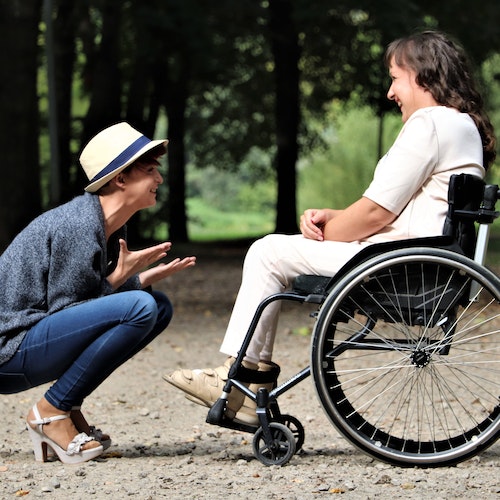Creating accessible and inclusive public spaces for adults with disabilities is essential for fostering independence and promoting an enriching community experience. Inclusive public spaces span a wide range of settings, from recreational facilities and parks to cultural institutions such as museums, zoos, and aquariums.
Ensuring that these environments are designed with accessibility and inclusivity in mind allows adults with disabilities to explore their interests, develop new skills, and forge social connections in a supportive and empowering atmosphere.
Designing for inclusivity not only benefits those with disabilities, but also contributes to a more diverse, equitable, and vibrant community. It is a reflection of our society’s values and our commitment to the principle of ‘Design for All.’ A society that recognizes and addresses the needs of its most vulnerable members is one that truly promotes independence and social connections.
The Importance of Inclusivity and Accessibility: Creating Welcoming and Supportive Public Spaces
Inclusive and accessible public spaces are paramount for ensuring that all members of a community can participate fully in various social, recreational, and cultural activities. When it comes to adults with disabilities, having public spaces that accommodate their diverse needs is especially important, as these environments can significantly enrich their quality of life. Key aspects of inclusive and accessible public spaces include:
- Barrier-free design: Incorporating ramps, elevators, and wider doorways into public spaces facilitates access and mobility for individuals with disabilities, enabling them to navigate these areas comfortably and safely.
- Sensory-friendly options: Public spaces that offer a range of sensory-friendly options, such as quiet rooms and subdued lighting, provide accommodating environments for individuals with sensory sensitivities.
- Clear signage and wayfinding: Ensuring that clear signage and wayfinding tools are available in public spaces helps adults with disabilities navigate these environments more effectively and autonomously.
- Accessible programming: Inclusive activities and programming, such as adaptive sports classes or sensory-friendly museum tours, can cater to the unique needs and preferences of adults with disabilities.
Fostering Independence and Social Connections: Enriching Experiences in Accessible and Inclusive Public Spaces
Accessible and inclusive public spaces have a positive impact on the independence and social connections of adults with disabilities, offering opportunities for personal growth and meaningful interactions within their communities. These spaces play a crucial role in:
- Encouraging self-sufficiency: Accessible public spaces empower adults with disabilities to explore their surroundings independently, thus fostering self-reliance and confidence.
- Nurturing peer relationships: Opportunities for social engagement in accessible and inclusive public spaces can facilitate the development of lasting friendships and support networks among adults with disabilities.
- Promoting mental well-being: Participating in engaging activities within inclusive public spaces can boost self-esteem, leading to improved mental well-being and satisfaction with life.
- Facilitating community integration: Accessible and inclusive public spaces help adults with disabilities feel valued and included in their communities, thus promoting overall integration and sense of belonging.
Key Examples of Accessible and Inclusive Public Spaces: Expanding Opportunities and Experiences
There is a wide array of public spaces that prioritize accessibility and inclusivity, ensuring adults with disabilities can enjoy an assortment of experiences within their communities. Some examples of these public spaces include:
- Recreation Centers: Accessible recreation centers offer adaptive sports, fitness classes, and a variety of other leisure activities for adults with disabilities, encouraging physical activity, and overall well-being.
- Parks and Outdoor Activities: Inclusive parks with wheelchair-friendly paths, adaptive playground equipment, and sensory gardens allow adults with disabilities to enjoy outdoor experiences in a safe and supportive environment.
- Cultural Institutions: Museums, zoos, and aquariums that offer accessible exhibits and sensory-friendly programming cater to the unique needs of adults with disabilities, providing enriching and educational experiences for all visitors.
- Public Transportation: Ensuring public transportation options, such as buses and trains, are accessible and user-friendly is crucial for helping adults with disabilities navigate their communities independently.
The Role of PASA Agencies in Supporting Accessible and Inclusive Public Spaces: Championing Full Community Participation
Program Approved Service Agencies (PASAs) like Extended Care Services play a vital role in supporting adults with disabilities to take advantage of the opportunities that accessible and inclusive public spaces provide. Key functions of PASA agencies in this regard include:
- Identifying suitable public spaces: PASA agencies research and identify accessible and inclusive public spaces that cater to the diverse needs of the adults they support, ensuring a variety of enriching experiences are available.
- Facilitating access to activities: By providing assistance in registering for classes, planning outings, and arranging transportation, PASA agencies help individuals with disabilities participate in activities within accessible and inclusive public spaces.
- Offering guidance and support: PASA agencies provide ongoing guidance and support, ensuring adults with disabilities have a positive, enjoyable, and safe experience when engaging with inclusive public spaces.
- Advocating for accessibility and inclusivity: PASA agencies actively advocate for improved accessibility and inclusivity within public spaces, championing the cause and helping create additional opportunities for adults with disabilities.
How Accessibility in Public Spaces Can Enhance the Lives of Adults with Disabilities
Ensuring the creation and promotion of accessible and inclusive public spaces is vital for enhancing the independence, social connections, and overall quality of life for adults with disabilities. These spaces provide a wealth of opportunities for personal growth, skill development, and meaningful interactions within the community.
PASA agencies like Extended Care Services play a vital role in supporting individuals with disabilities in accessing and enjoying these spaces with our supported community connections, paving the way for a more inclusive and supportive society.
By emphasizing the significance of accessible and inclusive public spaces, we can work towards creating communities that truly cater to the diverse needs of all individuals, enabling everyone to lead fulfilling and rewarding lives. Reach out to us today!

